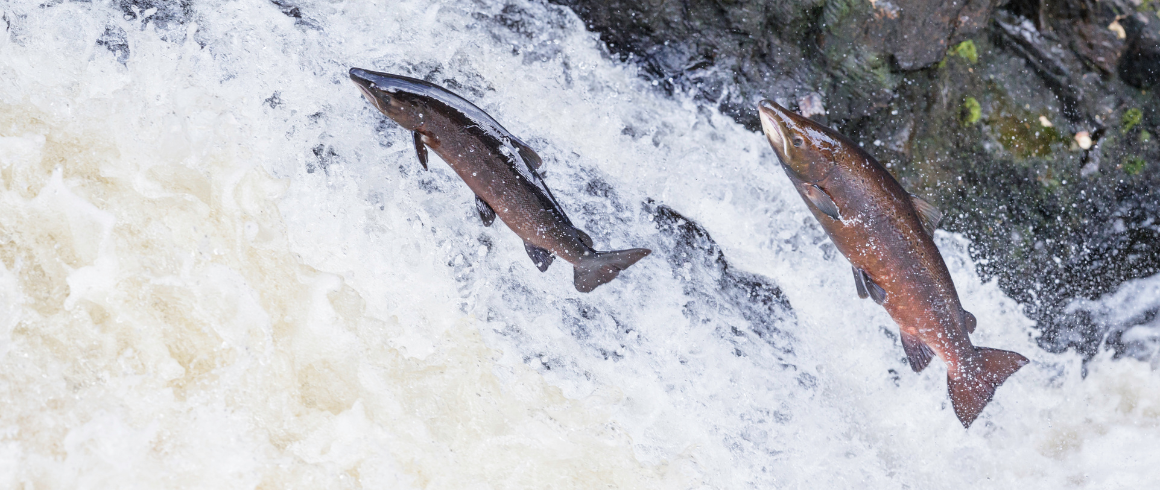August 2022 - Nick Measham, CEO WildFish
In October, the Corporate Partnership Programme’s 17th William Pitt Seminar ‘Who’s in charge?’ will bring together academics, policy-makers and corporate leaders to discuss and debate how we can balance conflicts between restoring our economy, dealing with geopolitics, helping people facing a huge dent in their finances, continuing to respond to the pandemic, and rescuing our planet – and who is in charge. Our invited blog for August is provided by Nick Measham, CEO of Wildfish, a charity committed to the conservation of freshwater fish species and their habitats. In the face of the recent drought and sewage overflows Nick powerfully argues for a rethink of our approach to exploiting water and other natural resources. Various actors are failing in their duty, how can we make sure that protecting nature is put at the centre of thinking and decision making?
You can sign up to attend the William Pitt Seminar virtually here.
Fixing the investment drought.
How do we get water companies to meet their obligations to protect our rivers and coasts? This summer’s drought has shown the miserable state of our water supply and treatment infrastructure. The great water company investment drought has been well and truly exposed.
Dumping untreated sewage and abstraction are ruining our waters – and the impact is not confined to nature. Wild fish and their habitats require good water quality and healthy flows, but the damage water companies cause puts our own vital and multi-dimensional relationship with water in deep jeopardy.
The faults – and the solutions – are not the companies alone. The government and its regulators, Ofwat and the Environment Agency (EA) are as much to blame as the ones doing the dumping. All must play a part in fixing the problems. Two things are needed immediately: transparency and enforcement.
Transparency allows us to see the extent of the mess, to assess investment requirements for sewage and water supply, to hold regulators to account, and to expose company behaviour which appears to enrich owners and managers at the expense of the environment. Enforcement is the means of correcting the failure. Ironically, we have all the legislation we need to ensure the water companies meet their obligations to the environment – and have done since privatisation. What we have lacked is Governments and regulators to do the job. The sewage story shows the problem.
Sewage subterfuge
Section 94 of the Water Industry Act 1991 (note this legislation has been in place for over 30 years) imposes an unambiguous duty on water companies to provide a sewage system “…for effectually dealing… with the contents of those sewers.” Case law has established that “effectually” means treating the sewage before relapsing it into rivers. So, water companies must provide sufficient capacity to treat effluent. Ofwat regulates this duty but the details of what they can discharge are set out in discharge permits issued by the EA who are also responsible for ensuring permit compliance.
There is a caveat, of course. On rare occasions of heavy rainfall, water companies are permitted to spill some of the combined rainwater and sewage inflow into the river to prevent their works being overwhelmed. What is not legal is spilling in the absence of rainfall - also known as a dry spill - or spilling before the sewage works has reached its permitted flow to full treatment (FFT) - AKA an early spill. Dry spills and early spills are illegal.
Pioneering work by Professor Peter Hammond and Ashley Smith of Windrush Against Sewage Pollution (WASP), using the water companies’ own data, exposed some of this environmental criminality. The data was, unsurprisingly, only obtained with great difficulty through Freedom of Information requests. Many companies still refuse to supply the data. Making this sewage work’ data available to all will leave nowhere for the industry, the regulators and Government to hide.
Enforcement finally happening
This illegal activity, stemming from underinvestment, has been likely going on for years and almost certainly since the Environment Agency – which is responsible for policing the Water Companies’ permits - introduced Operator Self-Monitoring (OSM) in 2010 to cut its own costs of monitoring the water industry.
Add pressure from Defra for Ofwat to push the companies to cut customer bills, cuts to the EA’s budget and you can see where this is headed. Assets were sweated, investments minimised, costs cut, sewage dumped, and excess profits made. If you let a monopoly regulate itself, bad things happen. Ofwat relied on the EA to bring breaches to its attention, and little turned up in its in-tray until campaigners exposed the sewage scandals.
Ofwat and the EA are beginning to hold the companies to account for their failure to invest and fulfil their responsibilities. Monitors are being installed to record the nature of sewage spills. However, the critical next step is for OSM to end. The companies and their investors have the financial resources to plug the infrastructure gap. Since privatisation in 1989, the companies have paid out virtually all their say £75bn profits in dividends. Reversing this flow needs to start now.
Water supply
The lack of investment in solutions which do not rely on depleting the environment mirrors the sewage story. The situation is most acute on our vulnerable chalk streams.
Southern Water (SW) promised the Environment Agency in 2018, in the strongest possible legal terms, it would find a way to stop taking water from the River Test in drought. It promised to find a solution by 2027. Only now is SW consulting on alternative proposals and - you guessed it - in this drought, the Test is still the lender of last resort. This puts the rivers already endangered salmon and sea trout at great risk yet again. And there is a lack of transparency over the actual supply deficits. Without this data, it is difficult to assess independently the adequacy of the investment proposals.
More widely, reservoirs, water recycling and desalination all need to become part of an environmentally robust solution. The impact of this year’s drought – a natural phenomenon – has been made much worse our reliance on abstracting water from rivers for the public water supply rather than investing in alternatives and fixing leaks
Revaluing water
Long-term, a rethink is required in our approach to exploiting water along with other natural resources. I believe we need to embrace the thinking set out by Partha Dasgupta in The Economics of Biodiversity: the Dasgupta Review. The central message is “Our economies, livelihoods and well-being all depend on our most precious asset: Nature.” Politicians must put Nature at the centre of their thinking.
We need to value this most precious asset and then make the investments required to sustain it. Our future depends on it. The price of water is too low.
Nick Measham, CEO WildFish
Nick leads the WildFish team. He feels strongly that evidence is key to influencing Governments and the regulatory bodies responsible for protecting wild fish. Nick’s obsession with water and fishing began when he was nine. He has been passionate about wild fish populations ever since. Nowadays, though, it is almost enough simply to know the fish are there as it is to cast a line.

